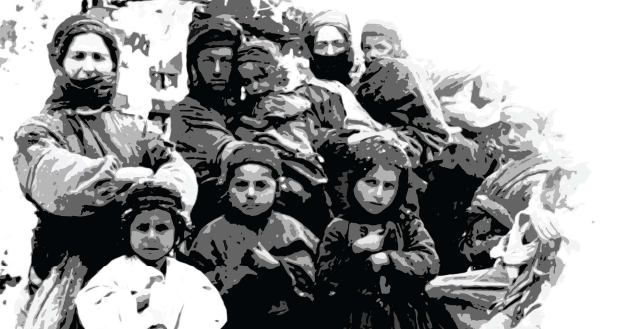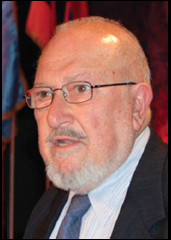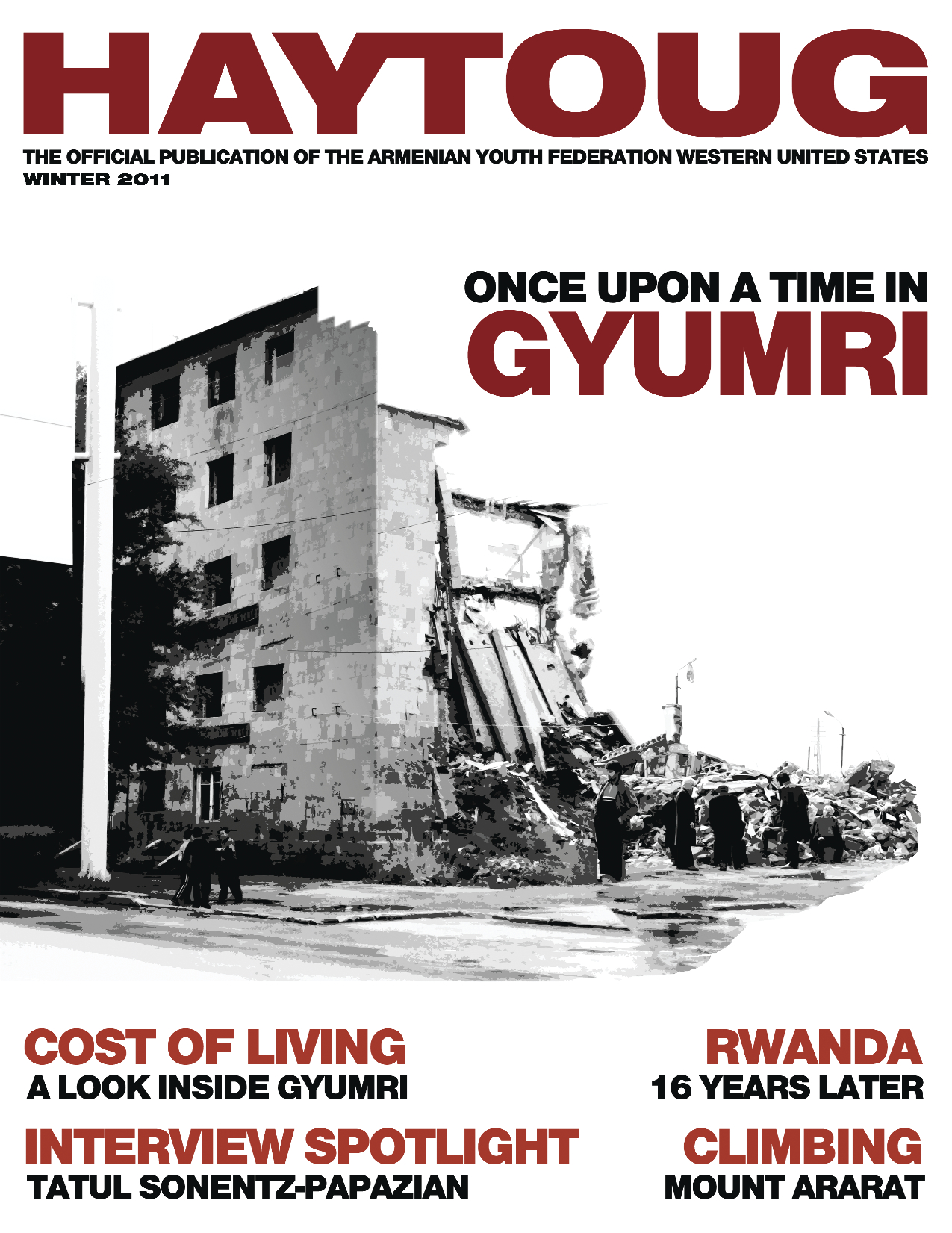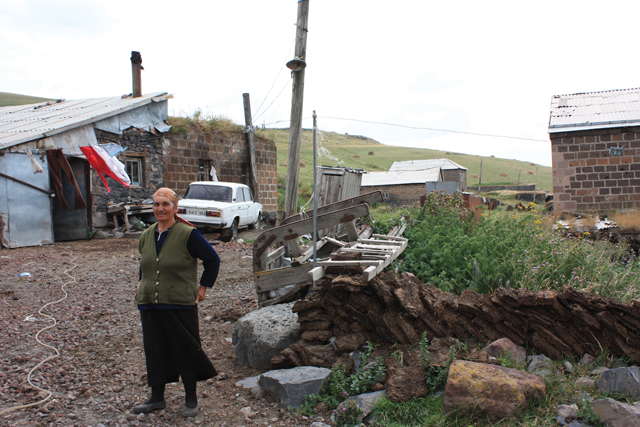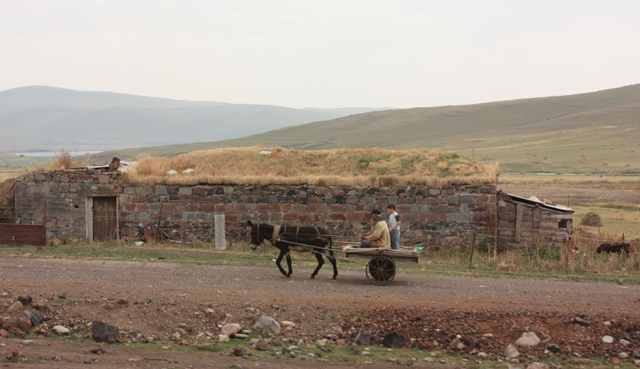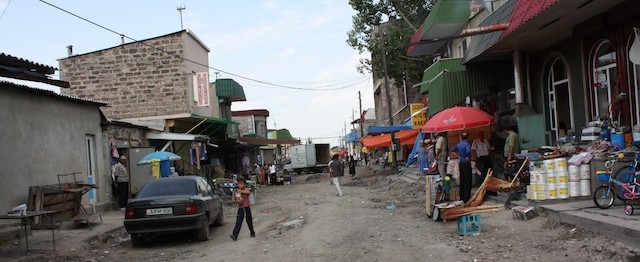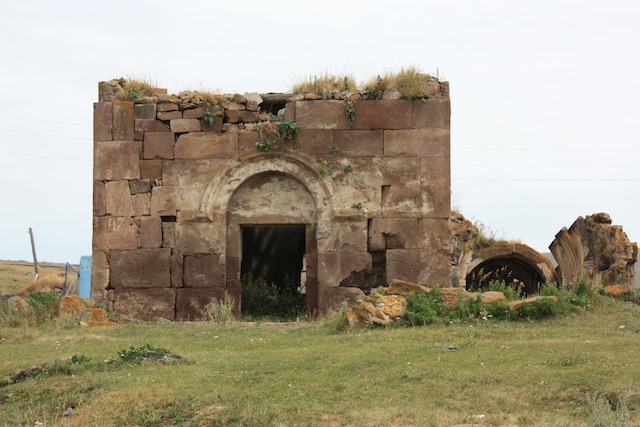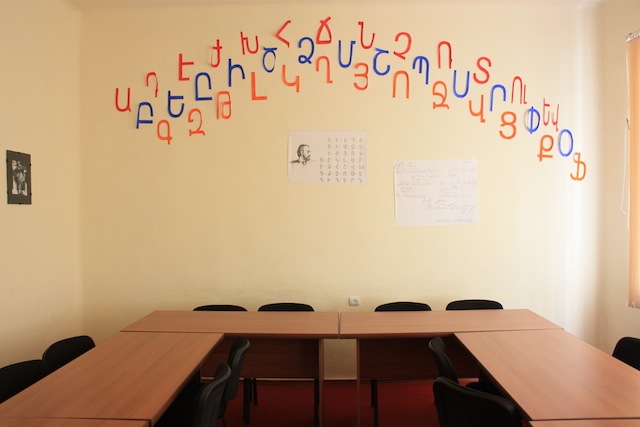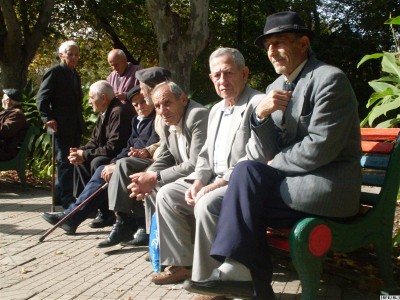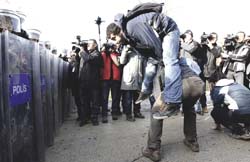A Crime Unpunished, A Case Unresolved
An Interview with Tatul Sonentz-Papazian
For its Winter 2011 issue, the Haytoug had the opportunity to catch up with Tatul Sonentz-Papazian, a champion of Armenian advocacy in the US who has played a pivotal role in the advancement of the Armenian Cause since as far back as the early 1960s.
After graduating from the Mekhitarist School in Cairo, Egypt, he went on to study graphic design and worked as an illustrator for various newspapers and magazines in Cairo. In 1951, he joined the Foreign Service and worked for the US Information Agency, as an art and publications director. Six years later, he moved to the US, where he was eventually asked to serve as the director of the ARF and 1st Republic of Armenia Archives and editor of the Armenian Review.
He currently directs the Publications Department of the Armenian Relief Society and is working on a book covering the 100 momentous years of the ARS for its Centenary this year.
HAYTOUG: As a veteran Hai Tahd activist, can you take us back to 1965 for a moment and describe the impetus behind the movement that developed during that period? Why was the 50th anniversary of the Genocide such a turning point and what made Armenians suddenly stand up to demand their rights?
TATUL SONENTZ-PAPAZIAN: I was involved in ACIA (American Committee for the Independence of Armenia) activities after its revival by the ARF Bureau in the early sixties. In Vahan Cardashian’s time, this select group of American personalities was trying to secure an American Mandate for Armenia, and it failed because there was no oil in Armenia. Cardashian—the founder of ACIA—was a lawyer married to a wealthy American socialite of New York. Until 1915, he was an attaché on the legal staff of the Imperial Ottoman embassy in Washington DC. When news of the genocide reached the US, he resigned from his post. Being financially secure and well connected, he decided to form a high level lobbying group to promote the Armenian Case. He was the only Armenian on the Committee and served as Executive Director.
As to your question:” what made Armenians suddenly stand up to demand their rights?”Armenians did not suddenly stand up in quest of their rights—there was a period of gradual recovery after the successive traumas of the 1915 Armenocide, the 1920 Kemalist-Bolshevik attack and destruction of the 1st Republic, and the 1930s Stalinist purges amounting to an attempt at “Houshaspanutiun” (the eradication of collective memory, “memoricide”, to coin a word) which almost succeeded in Soviet Armenia—through the re-writing of history, restructuring of the language with the infusion of foreign (Russian) words and changes in orthography, etc.—to wipe out our ancient and more recent memories, replacing them with a contrived history and bogus internationalist values of the “Homo Sovieticus” of a utopian future.
One must also remember Taleat Pasha’s boast in 1915, that he would deliver such a blow to the Armenians, that they would not be able to raise their heads for at least half a century… He was not too far off, was he? Fifty years later, in 1965, after years of low profile yet continuous Hai Tahd work spearheaded by the Delegation of the first Armenian Republic in Europe, and the ACIA in America, a consensus was achieved among leadership circles in both the Diaspora and Soviet Armenia to come out united in quest of our national rights. The momentum generated by the 50th Commemoration carried us all the way to the 60th Anniversary commemoration—achieved, once more, in unity of effort and purpose—as the armed struggle, although somewhat divisive, marked the start of political activism on a global scale—eventually leading to another united effort to liberate Artsakh, alongside a newly independent, though somewhat battered, Homeland.
H. What do you make of the current state of Hai Tahd activity here in the United States? What direction do you feel we need to go towards as a community in pursuing our Cause in the 21st Century?
TSP: Before getting to that, perhaps we should take a look at the events and the policies dictated by Western imperial interests—particularly those of the United States—in the Near and Middle East which, by the way, haven’t changed much to this day. Accordingly, our argument, presented in 1965 and after, was that by not implementing the resolutions of the Sevres Treaty, the just and logical solutions of festering problems were postponed in order to arrive at short-term, colonial arrangements that, in the long run, would pave the road to far more serious crises in Eastern Anatolia, the Caucasus, Mesopotamia and the Middle and Near East. Serious predicaments, as the present crises in the area demonstrate in such a violent fashion. Now, the Kurdish issue is coming to full view, while the Armenian Cause, now dormant in the “six vilayets”, still awaits final resolution in Karabagh. The main reason is that Turkey, the present Turkish state, was allowed to grab and keep former Ottoman holdings, such as Western Armenia, Kurdistan, Hellenic Pontus and Armenian Cilicia by brutal ethnic cleansing methods of massacre, deportation and forced assimilation. Those lands were no more Turkish than Greece, Bulgaria, Syria or Egypt, all former possessions of the Ottoman Empire. Therefore, the present Turkish Republic’s bloated boundaries cannot be regarded as historically justified, legitimate—or permanent, for that matter. Let us not forget, that at the time, the US Congress refused to recognize the Lausanne Treaty because Turkey had ignored President Wilson’s adjudication on the Turkish-Armenian boundaries.
As we know, Hai Tahd activity here in the United States was focused mainly on the genocide recognition issue which has not met with success so far. In my opinion, it should have been focused on putting a stop to the on-going genocidal processes that Turkey implements in Western Armenia to this day, instead of commemorating an on-going genocide, sending the erroneous message to the world, that the Armenian Genocide was a tragedy of the past century, and not a crime against universal human rights being committed unchallenged at this time through forced assimilation and conversion to Islam.
This new approach in the prosecution of Hai Tahd can be based on arguments presented below:
- It is a universally accepted dictum, that denial is the last stage of genocide; as such, it is the continuation of the genocidal process. Indeed, the Genocide started by the Ottomans in the 19th century and brought to its “Final Solution” stage by the chauvinistic adventurers of the Ittihadist government in 1915, has never truly ceased and—through a process of denials (denial of historical facts, denial of the right to use and teach the mother tongue, denial of the right to practice one’s professed religion, denial of ownership of inherited religious and cultural edifices and monuments) —continues to be implemented to this day against Armenian, Kurdish, Assyrian and other minorities, in the very heart of these peoples’ Turkish-controlled homelands. The denial policy, as you can see, has many facets that need selective attention.
- Armenians, by commemorating the 1915 – 1921 Genocide, by setting an on-going annual ritual in remembrance of a 6-year Yeghern, create the impression—both for their own people and the world community—that the Genocide has ceased , and all that remains to be done is to prove to the whole world, that a six year long genocide was indeed committed, ignoring the fact, that cloaked behind a consistent curtain of denial, the genocide—through forced assimilation—was still going on against the forcibly converted surviving Armenians and their descendents still on their native soil, coerced to hide their true identity behind Islamic Kurdish or Turkish names.
- Decades ago—particularly during the Nagorno Karabagh conflict, in order to keep Turkey on the defensive, and out of that conflict—the Armenians should have brought up the issue of the human and civil rights of their persecuted fellow countrymen in Eastern Anatolia, throwing a searchlight on Turkey’s total disregard for the numerous articles of the Lausanne Treaty—as well as the Universal Declaration of Human Rights —to which the Turkish State was and is signatory.
H. Some argue that, now that we have an independent Armenia, we should focus less on the Genocide and more on strengthening Armenia’s economy and statehood. What are your thoughts on this argument?
TSP: Those who bring forth this argument base it on a strictly state-, as opposed to nation-oriented strategic approach. The Armenian nation, at this date some nine million strong, 1/3 of them living within the landlocked and belligerently blockaded boundaries of the 3rd Republic, the remaining majority of 6 million scattered throughout a constantly shifting and unsettled Diaspora, simply cannot accept its present status imposed on it by the Genocide and its aftermath. A status based on multiple crimes of stunning proportions perpetrated against our nation by powers both within and outside the law—by untenable treaties signed under duress with and between rogue powers, often unrecognized, or outlawed at the time, by that same international community that today swears by the ‘sanctity’ of borders shaped by that very lawlessness…
Under such circumstances, the fate of an entire nation takes precedence, in our case, not at all at the expense of the security and welfare of the state, but precisely having that security and welfare in mind. The present landlocked Armenian Republic with its steadily diminishing population in its truncated boundaries, surrounded by predatory neighbors, can hardly be considered a viable haven for the future of the Armenian nation, whose just Cause is very much alive at this juncture of history, when global changes are taking place and the destinies of many nations are to be decided. In such circumstances, it would be nothing short of tragic to give up the fight for our legitimate national rights that have to be secured in order to guarantee the freedom, security and normal progress of Armenia, as a nation state.
H. Over recent months, there seems to be a growing rift between the governments of Turkey and Israel, as well as a strain in relations between Ankara and Washington. What do you make of these developments?
TSP: As I just stated, the world, as we know it, is changing at a great pace towards a destiny as yet unknown. Mighty powers are being brought to their knees while lesser or emerging national entities are maneuvering for their place in the sun. In all these changes there are geographic and demographic invariables to which geopolitics remain anchored.
The rift between erstwhile close allies, Israel and Turkey is the result of the latter’s recently mapped “Neo-Ottoman” posture, where Israel must play the role of perceived ‘enemy’ to give the new ‘Caliphate’s geopolitical image some Islamic credibility in the eyes of the Arab Middle East. Israel is receiving the blows meant for the Western powers—particularly the United States (for its present Kurdish policies), too important a Turkish ally to be openly pummeled by the latter. If all things proceed normally, this new Turkish gambit for hegemony will be checked in time by Egypt, Saudi Arabia and Iran. In all probability, Turkish-Israeli relations will return to their former level, since they remain anchored to geopolitical invariables which, so far, remain unaltered.
Based on the above analysis, I see no permanent impact (aside from shallow diplomatic maneuverings to give credence to a grossly overreaching Turkish gambit) on the basic tenets of the regional politics involving the Armenian Cause.
H. You’ve spoken in the past about the importance for us as Armenians to be socially conscious. How do you strike a balance between, on the one hand, struggling for your national rights and dedicating yourself to your people, and on the other, working for the betterment of all of humanity and showing solidarity with other causes?
TSP: There was a short lived movement initiated by a small group of idealists in the ranks of the ARF, after the establishment of the 1st Independent Republic, to drop the “A” from the initials of the name and to call it Federation of Revolutionaries (“Heghapokhakanneri Dashnaktsutiun”) uniting the efforts of all revolutionaries of neighboring nations and ethnic groups to bring about needed changes in the socioeconomic conditions in the region. Even then, some nationalists had come to understand, that there could be no real—and lasting—progress for one nation when neighboring nations were denied their basic human rights. This truth transcends time and remains valid also today. In that context, in order to work for the betterment of all humanity, obviously, one must show active solidarity with other causes struggling for recognition and justice. The loftiest ideals of mankind are universal in nature, and recognize no racial, religious or cultural boundaries.
H. Is there anything you would like to add or discuss regarding the Armenian Cause that we did not address?
TSP: I’d like to say, that the 1965 recovery of a nation that was left for dead in the sands of the Syrian Desert was predestined beyond the cynical prediction of Taleat. What followed the 50th and what will come tomorrow were, are and will be the fruits of our own efforts exerted under our own responsibility. We went through the crucible and learned a few things. The future will be ours only if and when we learn our lessons well and plan accordingly. We must learn to rely on our own potential—those who rely on handouts from the mighty and powerful will, inevitably, lose their freedom.
Mine was the first generation born in the post-Yeghern Diaspora. Although educated in westernized or western institutions, we still had some immunity against a total absorption by Western cultures and values. Western “liberal” values, particularly in the United States, tend to confuse nationalism with racism, or chauvinism, at best. They tend to promote an “internationalism” that, in essence, refutes the necessity of culturally distinct nations thereby rendering the very concept of internationalism meaningless. My generation, being brought up by survivors of the Yeghern, took a stronger stand on principles that we considered historically essential for our nation’s survival in a world society of many cultures existing in harmony. These issues were relevant then and will remain so if we are to prevail in our present struggle to build a viable future for our presently scattered nation.
Ours was a firm conviction, that the Armenian identity, along with its distinct language and culture, not only had to be preserved, it had to have its place in the sun, not relegated to the dusty corners of libraries and museums, condemned to eventual oblivion. Preservation, “Hayabahbanoum” alone, without development, without rubbing shoulders with the rest of the world, would leave us behind, frozen in time as relics.
We believed, that after all those millennia, there was more than enough energy in our unique culture, as expressed in our language, literature, music, art and architecture, to give us a place of honor in the 20th century and beyond. Today, standing beyond the threshold of the 21st century, I do believe that we have managed to pass that self-assurance, that faith in our destiny, to the coming generations.

